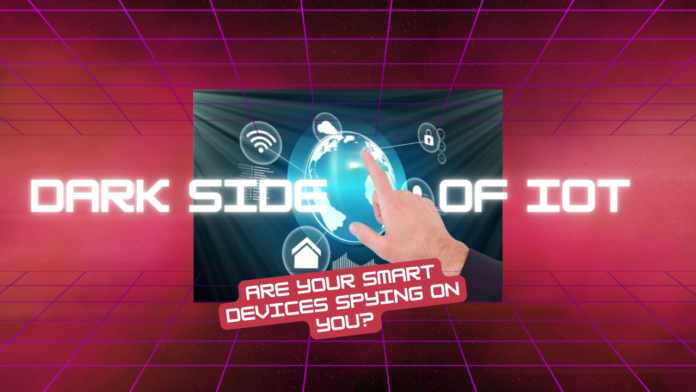The digital age has ushered in an era where smart devices are ubiquitous. From our homes to our workplaces, these gadgets promise convenience, efficiency, and connectivity. But as we embrace this technological marvel, an unsettling question arises: Are our smart devices spying on us?
Table of Contents
The Rise of Smart Devices
Over the past decade, the Internet of Things (IoT) has revolutionized how we interact with technology. With billions of connected devices worldwide, IoT has seamlessly integrated into our daily lives. Smart thermostats, refrigerators, security cameras, and even light bulbs now communicate with each other, creating a web of interconnected gadgets.
What is IoT?
IoT refers to the network of physical devices that are embedded with sensors, software, and other technologies to connect and exchange data with other devices and systems over the internet. This connectivity allows for automation, remote control, and enhanced functionality, making our lives easier and more efficient.
The Benefits of Smart Devices
Convenience and Automation
Smart devices offer unparalleled convenience. Imagine controlling your home’s lighting, temperature, and security systems from your smartphone, even when you’re miles away. Automation features allow tasks to be performed without human intervention, saving time and effort.
Improved Efficiency and Productivity
In both homes and businesses, IoT devices enhance efficiency. Smart appliances optimize energy usage, reducing costs and environmental impact. In industrial settings, IoT improves production processes, monitors equipment health, and ensures timely maintenance.
The Dark Side of IoT
Privacy Concerns
Despite their benefits, smart devices pose significant privacy risks. These devices collect vast amounts of personal data, often without users’ explicit consent. The data ranges from mundane usage patterns to sensitive information like voice recordings and video footage.
Data Collection Practices
Many IoT devices continuously gather data to improve functionality and user experience. However, this data collection often lacks transparency. Users may not be fully aware of what data is being collected, how it’s stored, and who has access to it.
How Smart Devices Spy on You
Voice Assistants and Microphone Eavesdropping
Voice-activated assistants like Amazon Alexa, Google Assistant, and Apple’s Siri are always listening for their wake word. This means their microphones are constantly on, potentially capturing conversations and background noises without users’ knowledge.
Smart Cameras and Surveillance
Smart cameras provide security but also pose a risk of unauthorized surveillance. Hackers can exploit vulnerabilities to gain access to these cameras, turning them into tools for spying. Even legitimate companies can use these cameras to collect data about users’ habits and behaviors.
Data Sharing with Third Parties
Many IoT devices share collected data with third-party companies. This data can be used for targeted advertising, sold to other businesses, or even handed over to law enforcement agencies. The lack of control over where your data goes and how it’s used is a significant privacy concern.
Case Studies of IoT Privacy Breaches
Famous Incidents and Their Impact
Several high-profile incidents highlight the dark side of IoT. For example, the 2015 VTech hack exposed the personal data of millions of children and parents. In another instance, hackers used a vulnerability in a smart refrigerator to gain access to a corporate network.
Lessons Learned
These incidents underscore the importance of robust security measures. They also highlight the need for consumers to be vigilant about the devices they bring into their homes and the permissions they grant.
Protecting Your Privacy in the Age of IoT
Secure Your Network
The first step in protecting your privacy is securing your home network. Use strong, unique passwords for your Wi-Fi network and IoT devices. Enable encryption and consider setting up a separate network for your smart devices.
Limit Permissions and Data Sharing
Review the permissions you grant to your IoT devices. Disable any features or data sharing options that are not essential. Be mindful of the information you provide when setting up these devices.
Regular Software Updates
Manufacturers frequently release updates to patch security vulnerabilities. Ensure your devices are running the latest firmware and software to protect against potential threats.
The Role of Legislation and Regulation
Current Laws Governing IoT
Various laws aim to protect consumer privacy, but the regulatory landscape is still evolving. The General Data Protection Regulation (GDPR) in Europe and the California Consumer Privacy Act (CCPA) are steps in the right direction, but more comprehensive legislation is needed.
Proposed Measures for Better Protection
Future regulations should mandate clearer disclosure of data collection practices and give consumers more control over their data. Enhanced security standards for IoT devices are also crucial to prevent breaches.
Future of IoT and Privacy
Emerging Trends in IoT Security
As awareness of privacy issues grows, the tech industry is responding with new security measures. End-to-end encryption, blockchain technology, and decentralized networks are some of the innovations aimed at safeguarding user data.
Innovations to Safeguard User Data
Companies are also developing IoT devices with privacy by design. These devices prioritize user privacy from the ground up, incorporating features like local data storage and anonymization techniques.
Conclusion
Balancing Convenience and Privacy
The integration of IoT devices into our lives is inevitable, and the benefits they offer are undeniable. However, it’s crucial to balance this convenience with the need for privacy. By being aware of the potential risks and taking proactive steps to protect our data, we can enjoy the advantages of smart technology without compromising our privacy.
Final Thoughts
As consumers, we must demand better transparency and security from manufacturers. By making informed choices and advocating for stronger regulations, we can ensure that our smart devices work for us, not against us.
FAQs
How do smart devices collect data?
Smart devices collect data through embedded sensors, microphones, cameras, and software. They monitor usage patterns, environmental conditions, and user interactions to provide enhanced functionality and personalized experiences.
Can I trust my smart device manufacturer?
Trust varies by manufacturer. It’s essential to research the company’s privacy policies, data handling practices, and security measures before purchasing a smart device. Look for companies with a strong reputation for protecting user privacy.
What are the signs that my device is spying on me?
Unusual behavior such as increased data usage, unexpected activity logs, and the device activating without prompt can be signs. Regularly check the device settings and permissions for any changes you didn’t authorize.
Are there any IoT devices that prioritize privacy?
Yes, some manufacturers prioritize privacy and security. Devices from companies like Apple are known for their strong privacy policies. Look for products with features like local data storage, end-to-end encryption, and minimal data collection.
How can I stay updated on IoT privacy issues?
Stay informed by following tech news, subscribing to security blogs, and joining online communities focused on privacy and IoT security. Regularly check for updates from manufacturers about new features and security improvements.

